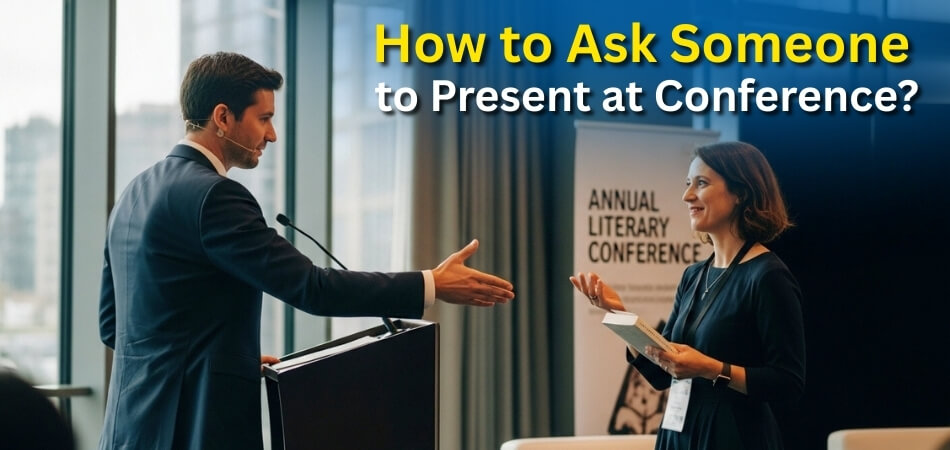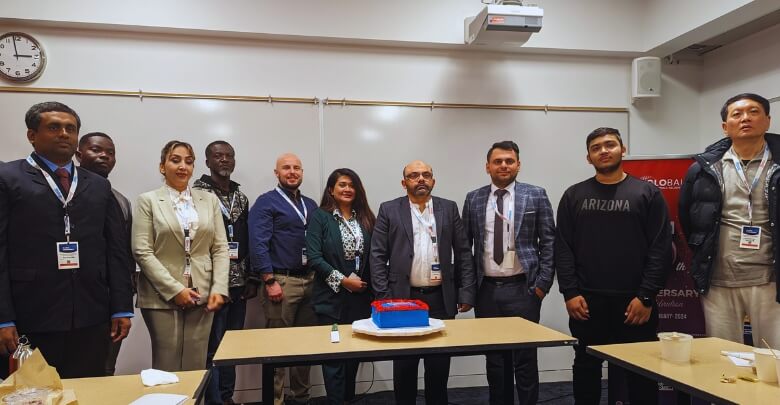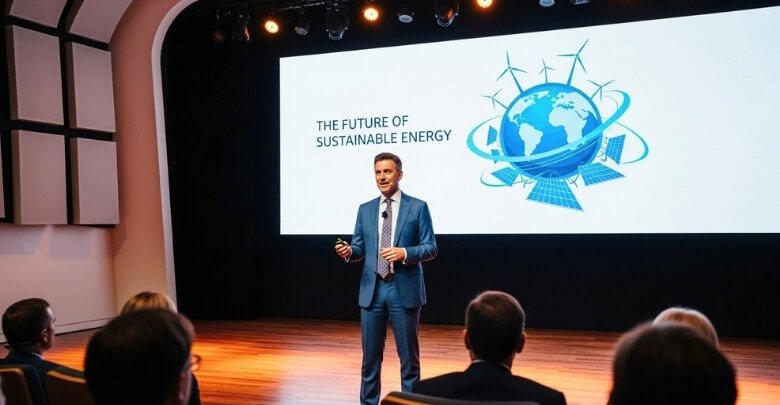Presenting at a conference is always a special opportunity that can create value for both speakers and listeners. Many people think about inviting someone, but are not sure of the right way. You might already have the question in mind: how to ask someone to present at conference?
To ask someone to present at a conference, send a short and clear invitation that explains the topic, date, time, location, and format. Match their expertise to the theme and express why you value their input. Use polite, simple language and offer support. Confirm details once they accept.
Do you want to know how this process can be done step by step? Then keep reading, because in this article, you will find every important detail explained in simple words.
How to Ask Someone to Present at Conference?
Inviting someone to present at a conference needs thought and planning. You must choose carefully, share details clearly, and respect their time. The way you ask matters as much as the person you invite. Let’s look at some useful steps together.

Right Speaker
Finding a good speaker means matching them with the conference theme. Their style should connect with the audience and bring real value. Look at their past work, check how they explain ideas, and see if they fit well with your topic.
Clear Invite
Making your invite simple helps the speaker decide quickly without stress. Use friendly words but explain your request clearly. Show that you value their time, and avoid long messages. This style shows you are organized and professional.
Key Details
When you share key details, the speaker feels prepared and valued. Always include the date, time, session length, and location. You can also mention if this is part of upcoming conferences. Clear details avoid stress and help the speaker plan smoothly.
Simple Language
Using simple words in your invite shows respect for their busy schedule. Long sentences or complicated terms can confuse the reader. Short, clear lines are more effective. People often respond faster when they understand your request in one easy read.
Gentle Follow-up
Waiting too long without hearing back can leave things uncertain. A short reminder after a few days is polite and effective. Make it kind, not pushy. This shows you are serious about their role but still respectful of their situation.
Confirm Plans
After they say yes, send a note to confirm everything. Repeat the date, time, and format again in writing. This keeps everyone on the same page. Clear confirmation makes the speaker feel supported and reduces the chances of mistakes later.
Offer Support
Helping your speaker with small things can make a big difference. You can provide slides, technical support, or help with promotion. This makes them feel valued and less stressed. A little effort from you can lead to a much better session.
Friendly Tone
Polite and kind words keep the process smooth and positive. Even if they refuse, a respectful invite leaves a strong impression. People remember when they are treated well. Keeping a warm tone can help build future connections too.
Presentation Format
Every conference uses different formats, and explaining them helps speakers prepare better. Giving clear options also shows that you are professional and thoughtful. These are some common types of formats you can share with your invite:
Oral Presentation (with slides)
This format usually lasts 10–15 minutes and works well for structured talks. The speaker explains the main ideas with slides and ends with questions. It is the most common type used in professional events. Here is a sample you can check out.
Download PDF
Poster Presentation
In this type, posters are displayed during open sessions for discussion. Attendees walk around and ask questions directly to the presenter. This format is very useful for research or data-heavy topics. Here is a sample you can check out.
Download PDF
Symposium Presentation
A symposium involves several speakers talking about a shared theme. Each talk is about 10 minutes long and connects with others. This keeps the audience focused while giving them many viewpoints. Here is a sample you can check out.
Download PDF
Lightning Talk
Very short talks of 3–5 minutes are great for one strong idea. Only a few slides are used, and messages stay simple and clear. This format is perfect for tips or small updates. Here is a sample you can check out.
Download PDF
Workshop Presentation
Workshops take more time, usually between 30–60 minutes. They include activities, exercises, or live demos to teach skills. People learn by doing rather than only listening. Here is a sample you can check out.
Download PDF
Asking a speaker needs both planning and simple communication. Sharing details clearly helps the speaker feel more confident and ready. Respectful words show professionalism and build trust with your chosen speaker. A friendly style always improves the chances of a positive reply.
Who Should You Invite to Present at Your Conference?
Picking the right speakers can make a big difference in how your conference turns out. A strong speaker not only shares knowledge but also keeps people engaged. To make the right choice, there are a few things you should look at closely.
Match With Topic
Choose people whose recent work connects with your theme. If your event is about new technology, invite speakers who are active in that space. Their fresh knowledge and updates will keep the audience interested and make the sessions more useful.
Review Past Work
Before sending an invite, check the speaker’s past talks, writing, or workshops. This helps you see their style and how well they explain things. Selecting experienced speakers is key because they are more likely to deliver a successful conference presentation that connects with the audience.
Consider Availability
Even the best speaker won’t help if they cannot join. Make sure the person you want is available on your dates. Early communication gives both sides enough time to prepare well and avoid last-minute issues.
Mix of Voices
Try to bring different voices to the stage. If every speaker has the same background or style, the sessions may feel repetitive. A mix of voices adds variety, keeps things lively, and helps cover the topic from more angles.
Audience Level
Think about who will attend. Some speakers are great at simplifying complex topics, while others shine when speaking to people with more background knowledge. Matching the speaker’s level to the audience ensures everyone can follow and learn.
Choosing speakers is about balance. When you look at their work, past talks, availability, and how they fit your audience, you can build a program that feels fresh and valuable.
What Details Must Be Ready Before You Send an Invite for Conference Presentation?
Before you send an invite to someone for a conference presentation, it is very important to have some clear details ready. Without this information, your invite might feel incomplete and may confuse the speaker. When you share the right details, it also shows that you are well-prepared and serious about the event.
- Event Date, Time, and Location: Make sure you clearly mention when and where the event will take place, so the speaker can plan without confusion.
- Audience Size and Level: Give an idea about how many people will attend and whether they are beginners, experienced, or experts in the topic.
- Session Format: Explain if the presentation is a keynote, panel discussion, or workshop, so the speaker can prepare the right way.
- Time on Stage: Let the speaker know how long they will have to present, so they can design the talk within the limit.
- Q&A Plan: Tell them if there will be a question-and-answer session, and how much time is set aside for that part.
- Offer Details: Share if you are covering travel, food, or accommodation, and whether there is a speaker fee included for their participation.
- Recording Plan: Mention if the session will be recorded or live-streamed, so the speaker can decide if they are comfortable with it.
Having all these details ready before sending an invite not only makes communication easier but also builds trust with the speaker. It avoids unnecessary back-and-forth and helps everyone stay on the same page.
How Do You Write a Strong Subject Line for the Invite Email for Conference Presentation?
Strong subject lines often make the difference between an opened email and one that’s skipped. Clear wording respects the speaker’s time, while a poor choice may be ignored. Below are tips to create subject lines that work effectively.
Clear Words
When writing, use words that are easy to understand and direct. Avoid long phrases that can confuse or waste the reader’s time. A short and clear line gives the main idea quickly. People prefer simple words that share the purpose without extra effort.
Direct Example
One useful subject line is: “Invite to Speak at [conference], [date].” This line is simple and polite and gives a clear reason. Adding the date gives a quick reminder of the event. The speaker knows right away why the email was sent.
Talk Example
Another subject line could be: “Short Talk on [topic], [date], time [20 Minutes].” This version highlights the main topic along with time details. It helps the reader see the expectation without opening the full mail. This approach works well when time is limited for the speaker.
Session Info
Adding session details in the subject line can be helpful as well. You may include title, talk format, stage time, and Q&A. These details give quick context for busy speakers who handle many invites. It allows them to see if the request matches their style.
Event Info
Sometimes adding event details gives a stronger picture of the subject. You can include date, venue or platform, audience type, and audience size. With these details, the speaker gets a clear sense of the plan. It helps them decide quickly whether to accept or decline.
Extra Info
There are times when extra information is best added in the subject. Including travel cover, fee, recording plan, slide deadline, or reply deadline helps. This may sound direct, but it saves time for both sides. The speaker can plan ahead and give a faster response.
Here’s a sample you can check out for an idea:
Subject Line Options (choose one):
- Invite to Speak at [Conference Name], [Date]
- Short Talk on [Topic], [Date], Time [20 Minutes]
- [Session Title], [Format], [Time on Stage], with Q&A
Email Body Template
Hello,
We are excited to invite you to present at our upcoming conference, [Conference Name], which will take place on [Date] at [Venue/Platform]. The event will bring together an audience of around [Audience Size], including [Audience Type].
Your session details are as follows:
- Title/Idea: [Session Title or Topic]
- Format: [Talk / Panel / Workshop]
- Duration: [Minutes on Stage] + [Q&A time if any]
Event details to note:
- Date: [Insert Date]
- Venue/Platform: [Insert Venue or Online Platform]
- Audience Type and Size: [Describe briefly, for example: professionals, researchers, students, etc.]
Practical details for your planning:
- Fee or Travel Cover: [Insert info if applicable]
- Recording Plan: [Mention if sessions will be recorded and shared]
- Slide Deadline: [Insert date for slide submission]
- Reply Deadline: [Insert deadline to confirm participation]
We would be honored to have you join us and share your insights. Please confirm by replying to this email before [Reply Deadline].
Thank you, and we look forward to your positive response.
Best regards,
[Your Team / Conference Organizing Committee]
A strong subject line helps your invite stand out among others. Each clear word makes the speaker’s decision easier and quicker to make. Details like date, topic, and time always make the invite stronger. Simple subject lines create trust and improve the response you receive.
Why Is Consistency Important in Conference Presentations?
Attending a conference should feel clear and organized from start to finish. Every session needs to flow seamlessly so the audience never feels lost. Consistency allows presenters to deliver professionally. Let’s explore why this matters so much.
Professional Look
A conference feels more reliable when every presentation follows a clear standard. The audience can focus on the topic instead of noticing random differences. This gives the event a polished look. It also makes the speakers feel like part of a well-planned program.
Clear Understanding
When sessions are consistent, people understand them without much effort. They can follow the slides, style, and timing easily. This avoids confusion and builds trust in the event. It also means everyone gets the same chance to explain their points.
Smooth Flow
A conference with a steady flow keeps people more interested. Moving from one session to another feels natural instead of confusing. Presenters know the expected timing and format, so they stay on track. This makes the event enjoyable for both speakers and listeners.
Equal Standard
Consistency across sessions comes from setting the same basic criteria for the presentation, which keeps the event smooth and professional. Everyone gets equal chances to share ideas. This avoids unfair differences and helps the audience compare topics in a fair way.
Audience Comfort
People listening to many talks prefer a stable pattern. They know what to expect, and this makes them feel comfortable. Familiar structures reduce mental effort and increase focus on content. A consistent setup helps the audience enjoy and learn without distractions.
Conference presentations work best when they stay consistent and clear. A common style helps the audience enjoy and understand the sessions better. Speakers feel supported and guided by simple rules. With balance, the whole event becomes professional and easy to follow.
FAQs About How to Ask Someone to Present at Conference?
Inviting someone to speak at a conference can feel challenging at first. Many small details matter, from how you word your request to how you follow up. A clear and polite approach can make the process much easier. Below are some common questions and answers that can guide you.
How Early Should You Ask?
It is always better to ask well in advance of the event. Early invites give speakers enough time to plan and adjust their schedules. A request made too late may force them to decline. Sending it months before shows respect for their time.
Should You Explain the Theme?
Giving a short note about the theme helps the speaker understand the focus. It guides them in shaping their talk and preparing the right content. Without this, they may feel unsure about what is expected. A simple explanation builds trust and clarity.
Can You Suggest Topics?
Sometimes it helps to suggest a few topics for the speaker. This shows that you have thought about their strengths and audience needs. Suggestions also make the planning easier and faster for both sides. Keep them open-ended so the speaker feels comfortable.
How Formal Should It Be?
The tone should stay polite but not overly stiff or heavy. Too much formality may make the invite sound cold or distant. Too casual can look unprofessional and careless. A balanced tone works best and leaves a strong impression.
Is It Okay to Call?
Phone calls can sometimes help, but they should come after an email. A call without notice may feel pushy or rushed for the speaker. Calling after the invite shows you are serious about their role. Keep the call short, polite, and respectful.
Should You Mention Benefits?
Sharing benefits can make the invite more appealing and fair. Benefits may include networking, recognition, or the chance to share new ideas. Speakers appreciate knowing what they gain from saying yes. Highlighting benefits makes your invite sound more thoughtful and clear.
How to Handle a Refusal?
If a speaker says no, thank them kindly for their time. Never make them feel guilty or pressured after declining. A polite reply keeps the door open for future events. Respect builds lasting relationships even if they refuse once.
Should You Provide Deadlines?
Clear deadlines help speakers manage their preparation and responses better. Without deadlines, they may delay or forget to reply altogether. Be firm but kind when giving these timeframes. A deadline makes planning easier for both sides of the invite.
Can You Invite More Than One?
Inviting multiple people is common, but each invite must feel personal. Copy-paste invites often look careless and reduce your chance of success. Write each one with specific details about the speaker’s value. Personal touches show respect and care in your request.
How to Show Gratitude?
A thank-you message always strengthens your professional bond with a speaker. Gratitude makes them feel valued and respected for their effort. Send a short note before, during, or after the event. Simple thanks go a long way in building trust.
Conclusion
Inviting a speaker requires care, clarity, and respect. By sharing details early, keeping language simple, and following up gently, you make the process smooth and welcoming. This clear communication answers the question of how to ask someone to present at conference.
Building strong connections with speakers is about balance and professionalism. Be thoughtful with your invite, confirm details clearly, and offer support when needed. With these simple tips, you are ready to invite confidently. Best wishes for your conference.







